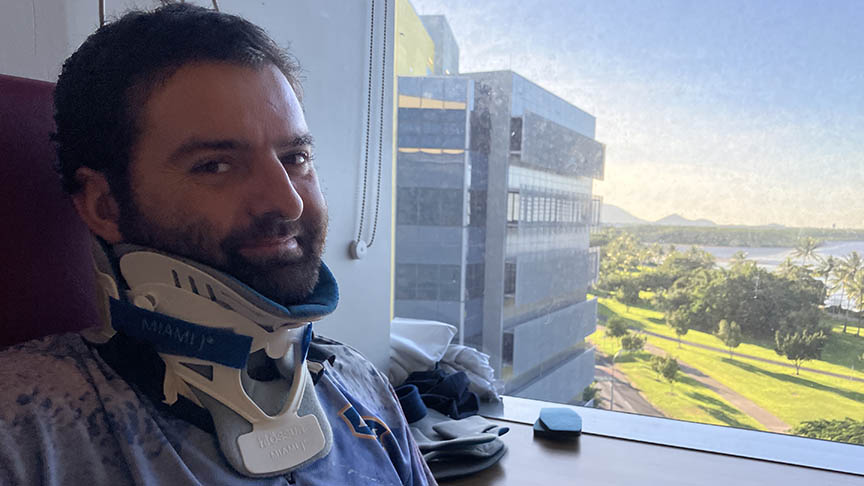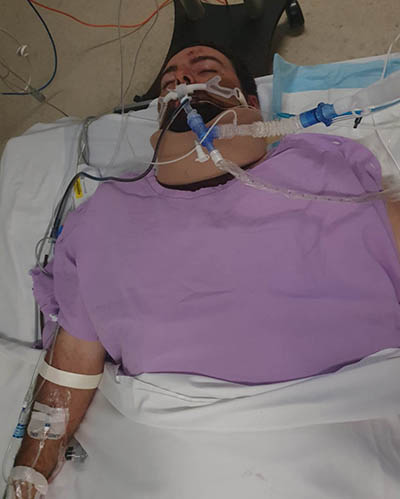
The last thing Danyon Hoffman remembers after crashing his four-wheel drive, is looking up at helicopter blades, as a rescue chopper crew prepared to rush him to Cairns Hospital.
Just a few hours earlier, Danyon, 29, had been driving with a friend in his Toyota Landcruiser, on his rural property, about three hours west of Cairns, when he believes he hugged a corner too hard, and lost control of his vehicle.
Danyon was ejected from the Landcruiser, via the window; and unable to move.
His friend, who only suffered a broken collarbone, staggered off to find help – but passed out en route.
If it wasn’t for a neighbour driving past the crash scene two hours later, Danyon and his friend may not have made it.
‘He grabbed me, put me in the ute, and we drove back to the homestead,’ Danyon said.
‘He put me in there in the loungeroom for a bit. I was on the floor of the loungeroom in agonising pain.
‘My wife Rachel wanted to call the chopper straight away and I was acting big and tough, saying don’t ‘don’t ring the helicopter – I’ll be right’. She did it anyway, luckily.’
When the rescue helicopter crew arrived, Danyon discovered just how serious the extent of his injuries was.

‘All I can remember is sort of sitting with my head looking at the blades of the helicopter,’ he said.
‘And then that was it. I woke up in Cairns Hospital 2-3 days later, pulling the tubes and that out of me, when they woke me up.’
Due to the timing and severity of his injuries, Danyon was considered a prime candidate for an Australia and New Zealand wide medical study that Cairns Hospital is currently participating in.
The Fibrinogen Early In Severe Trauma Study (FEISTY II) examines the best use of blood products in treating severely bleeding trauma patients.
In Australia, uncontrolled bleeding is directly responsible for about a third of in-hospital trauma deaths.
The study, which began at Gold Coast Health, looks at how early fibrinogen – the component of blood that is responsible for clotting – can be used on a patient suffering significant bleeding, in order to improve their chances of survival.
Cairns Hospital ICU research nurse Sarah Furness said in Danyon’s case, he needed emergency blood as well as other medications to save his life in the case of significant haemorrhage.
‘The FEISTY II study is comparing the efficacy of two lifesaving treatments in haemorrhage, Cryoprecipitate and Fibrinogen Concentrate,’ she said.
‘Cairns is the first regional hospital to participate in this trial, which will potentially have extensive lifesaving implications for many patients not only in the Cairns district, but also remote and outlying regions.
‘We are hoping to determine which treatment is superior in terms of number days alive and out of hospital at 90 days.’
The trial’s principal investigator, Cairns ICU Director Dr Cath Tacon, said they were extremely appreciative and grateful to patients like Danyon and their families who consented to the use of collating their data and looking at their outcomes.
‘The use of medical data is crucial, and we use the results from various blood tests during the ICU admission and discharge to the ward.
‘In Danyon’s case, his positive outcome is thanks to firstly the responders and his wife, but then the lifesaving interventions and care he received from the retrieval team, ED staff and ICU staff, who all do such a great job in these cases.
‘We are looking forward to growing the FEISTY II clinical trial enrolments further and contributing to knowledge that improves medical treatment of trauma patients.
Danyon, who was discharged from Cairns Hospital after three weeks, said he was stoked to be involved in medical research at the hospital.
‘It’s unfortunate it had to be me, but I was happy to help out,’ he said.
‘It’s all about saving time, and in situations like mine - every second counts.’